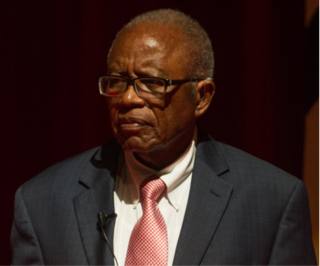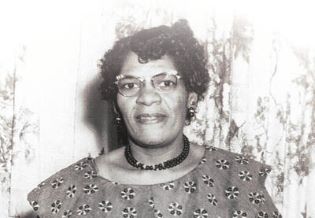Related Research Articles

Rosa Louise McCauley Parks was an American activist in the civil rights movement best known for her pivotal role in the Montgomery bus boycott. The United States Congress has honored her as "the first lady of civil rights" and "the mother of the freedom movement". Parks became a NAACP activist in 1943, participating in several high-profile civil rights campaigns. On December 1, 1955, in Montgomery, Alabama, Parks rejected bus driver James F. Blake's order to vacate a row of four seats in the "colored" section in favor of a White passenger, once the "White" section was filled. Parks was not the first person to resist bus segregation, but the National Association for the Advancement of Colored People (NAACP) believed that she was the best candidate for seeing through a court challenge after her arrest for civil disobedience in violating Alabama segregation laws, and she helped inspire the Black community to boycott the Montgomery buses for over a year. The case became bogged down in the state courts, but the federal Montgomery bus lawsuit Browder v. Gayle resulted in a November 1956 decision that bus segregation is unconstitutional under the Equal Protection Clause of the 14th Amendment to the U.S. Constitution.

Claudette Colvin is an American pioneer of the 1950s civil rights movement and retired nurse aide. On March 2, 1955, she was arrested at the age of 15 in Montgomery, Alabama, for refusing to give up her seat to a white woman on a crowded, segregated bus. This occurred nine months before the more widely known incident in which Rosa Parks, secretary of the local chapter of the National Association for the Advancement of Colored People (NAACP), helped spark the 1955 Montgomery bus boycott.
Mary Louise Ware is an African-American civil rights activist. She was arrested in October 1955 at the age of 18 in Montgomery, Alabama for refusing to give up her seat on the segregated bus system. She is one of several women who were arrested for this offense prior to Rosa Parks that year. Parks was the figure around whom the Montgomery bus boycott was organized, starting December 5, 1955.

The Montgomery bus boycott was a political and social protest campaign against the policy of racial segregation on the public transit system of Montgomery, Alabama. It was a foundational event in the civil rights movement in the United States. The campaign lasted from December 5, 1955—the Monday after Rosa Parks, an African-American woman, was arrested for her refusal to surrender her seat to a white person—to December 20, 1956, when the federal ruling Browder v. Gayle took effect, and led to a United States Supreme Court decision that declared the Alabama and Montgomery laws that segregated buses were unconstitutional.

The United States District Court for the Middle District of Alabama is a federal court in the Eleventh Circuit.

Edgar Daniel Nixon, known as E. D. Nixon, was an American civil rights leader and union organizer in Alabama who played a crucial role in organizing the landmark Montgomery bus boycott there in 1955. The boycott highlighted the issues of segregation in the South, was upheld for more than a year by black residents, and nearly brought the city-owned bus system to bankruptcy. It ended in December 1956, after the United States Supreme Court ruled in the related case, Browder v. Gayle (1956), that the local and state laws were unconstitutional, and ordered the state to end bus segregation.

Frank Minis Johnson Jr. was a United States district judge and United States circuit judge serving 1955 to 1999 on the United States District Court for the Middle District of Alabama, United States Court of Appeals for the Fifth Circuit and United States Court of Appeals for the Eleventh Circuit. He made landmark civil rights rulings that helped end segregation and disenfranchisement of African Americans in the South. In the words of journalist and historian Bill Moyers, Judge Johnson "altered forever the face of the South."
The Montgomery Improvement Association (MIA) was formed on December 5, 1955 by black ministers and community leaders in Montgomery, Alabama. Under the leadership of Ralph Abernathy, Martin Luther King Jr. and Edgar Nixon, the MIA was instrumental in guiding the Montgomery bus boycott, a successful campaign that focused national attention on racial segregation in the South and catapulted King into the national spotlight.

Fred David Gray is an American civil rights attorney, preacher, activist, and state legislator from Alabama. He handled many prominent civil rights cases, such as Browder v. Gayle, and was elected to the Alabama House of Representatives in 1970, along with Thomas Reed, both from Tuskegee. They were the first black state legislators in Alabama in the 20th century. He served as the president of the National Bar Association in 1985, and in 2001 was elected as the first African-American President of the Alabama State Bar.
The Women's Political Council (WPC), founded in Montgomery, Alabama, was an organization that formed in 1946 that was an early force active in the civil rights movement that was formed to address the racial issues in the city. Members included Mary Fair Burks, Jo Ann Robinson, Maude Ballou, Irene West, Thelma Glass, and Euretta Adair.

Johnnie Rebecca Daniels Carr was a leader in the Civil Rights Movement in the United States from 1955 until her death.

Aurelia Shines Browder Coleman was an African-American civil rights activist in Montgomery, Alabama. In April 1955, almost eight months before the arrest of Rosa Parks and a month after the arrest of Claudette Colvin, she was arrested for refusing to give up her bus seat to a white rider.
Seybourn Harris Lynne was an American jurist. He was United States district judge for the United States District Court for the Northern District of Alabama. He was Chief Judge of the court from 1953 to 1973. At the time of his death, he was the longest-serving judge on the federal bench and the last remaining judge appointed by President Truman. Judge Lynne served from 1946 to 2000, although his final 27 years were in senior status.

Rosa Parks Day is a holiday in honor of the civil rights leader Rosa Parks, celebrated in the U.S. states of California and Missouri on her birthday, February 4, in Michigan on the first Monday after her birthday, and in Ohio and Oregon on the day she was arrested, December 1.
William Armistead "Tacky" Gayle, Jr. was an American politician for the Democratic Party, soldier and writer who was the mayor of Montgomery, Alabama, from 1951 to 1959.

The Rosa Parks Museum is located on the Troy University at Montgomery satellite campus, in Montgomery, Alabama. It has information, exhibits, and some artifacts from the 1955 Montgomery bus boycott. This museum is named after civil rights activist Rosa Parks, who is known for refusing to surrender her seat to a white person on a city bus.
Susie McDonald, also known as Miss Sue, was an African American activist who served as one of the plaintiffs in the bus segregation lawsuit Browder v. Gayle (1956) in Montgomery, Alabama. She was arrested for violating bus segregation law on October 21, 1955. She was a widow at the time, in her seventies, walked with a cane, and was light-skinned enough to be mistaken for white by bus operators, though she enjoyed correcting this misconception. Her husband Tom had done railroad work, and she received his pension.
Viola White (1911–1954) was an African-American woman who lived in Montgomery, Alabama and is best known for her resistance to segregated bus laws. At 35 years old, in 1944, White was arrested for refusing to give up her seat. White's arrest occurred a decade before Rosa Parks' similar act of resistance, which is credited for starting the Montgomery Bus Boycott. White worked at Maxwell Air Force Base.
Booker T. Washington School was in Montgomery, Alabama. It was at 632 South Union Street and succeeded Swayne College which closed in 1937. The Swayne school building was demolished in 1948 to make way for Booker T. Washington High School, Montgomery's first high school for African American students.

Transit Equality Day is a holiday in honor of the civil rights leader Rosa Parks, celebrated in the United States on her birthday, February 4.
References
- 1 2 3 Browder v. Gayle, 142 F. Supp. 707 (M.D. Ala.), affirmed, 352 U.S. 903 (1956) (per curiam).
- ↑ "Browder v. Gayle, 142 F. Supp. 707 - Dist. Court, MD Alabama 1956 - Google Scholar" . Retrieved December 9, 2019.
- 1 2 3 "Browder v. Gayle, 352 U.S. 903 | The Martin Luther King, Jr., Research and Education Institute". Kinginstitute.stanford.edu. April 24, 2017. Retrieved December 9, 2019.
- 1 2 Troy Jackson (2008). Becoming King: Martin Luther King, Jr. and the Making of a National Leader. University Press of Kentucky. p. 117.
- 1 2 Jeanne Theoharis (2018). A More Beautiful and Terrible History: Beyond the Fables of the Civil Rights Movement. Beacon Press. pp. 144–. ISBN 978-0-8070-7587-6.
- ↑ http://www.gpo.gov/fdsys/pkg/USCODE-2009-title42/pdf/USCODE-2009-title42-chap21-subchapI-sec1981.pdf [ bare URL PDF ]
- ↑ http://www.gpo.gov/fdsys/pkg/USCODE-2011-title28/pdf/USCODE-2011-title28-partIV-chap85-sec1331.pdf [ bare URL PDF ]
- ↑ "Archived copy" (PDF). Archived from the original (PDF) on July 23, 2015. Retrieved February 19, 2015.
{{cite web}}: CS1 maint: archived copy as title (link) - ↑ http://www.gpo.gov/fdsys/pkg/USCODE-2009-title28/pdf/USCODE-2009-title28-partVI-chap155-sec2281.pdf [ bare URL PDF ]
- 1 2 "Alabama unveils statue of civil rights icon Rosa Parks". Richmond Free Press. December 6, 2019.
- ↑ "Rosa Parks statue unveiled in Alabama on anniversary of her refusal to give up seat". WJLA. December 2019. Retrieved December 9, 2019.